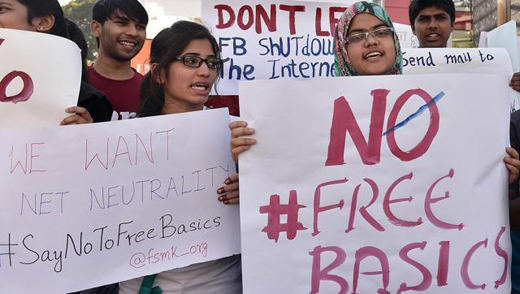How Mark Zuckerberg’s Free Basics lost to net neutrality in India
Mangalore Today News Network
Bengaluru, Feb 10, 2016: On Monday afternoon, Mumbai-based entrepreneur Mahesh Murthy wrote on his Facebook Timeline — “On differential pricing and Facebook Free Basics or Airtel Zero....They’re all banned! We won!”

It was a message many among Murthy’s 24,000-odd followers were waiting to read. Just minutes before, the Telecom Regulatory Authority of India (TRAI) had said that differential pricing for accessing content on the Internet, or what the opponents of it call the absence of Net Neutrality, will be treated as illegal and attract a fine of up to Rs 50 lakh if violated.
In the last few months preceding TRAI’s verdict, Mahesh and a small group of like-minded individuals were opposing Facebook founder and CEO Mark Zuckerberg’s move to bring Free Basics to India. For the $18-billion social media giant based in Silicon Valley, the stakes were too high — enough to have reportedly spent Rs 200-300 crore on a media campaign in India in the last week of December 2015.
“It (fighting Facebook) was the right thing to do. What Zuckerberg was trying to do was completely wrong. We were just a bunch of guys, who got organised on Slack and strategised our move,” Murthy told HT. Slack is a cloud-based teamwork application. This group had professionals with background in law, technology, media etc.
Kiran Jonnalagadda along with Nikhil Pahwa, founder and publisher of MediaNama created a parallel movement under Savetheinternet banner. Jonnalagadda, co-founder of HasGeek, said for a year he had to take a break from work to defend Net Neutrality. “It was important, else it was going to affect our business in the long run.”
The road to victory did come with a price for Murthy as well.
For starters, his good friend Kirthiga Reddy, MD of Facebook India, slipped off his network. “Our children go to the same school in Mumbai. We live around the same area in Mumbai. But I think it will be ok,” he said.
And then, in the midst of the campaign, Murthy said his WhatsApp account stopped working ‘inadvertently’. Facebook bought messenger service provider WhatsApp for $19 billion in 2014. The latter has over a billion users worldwide.
Zuckerberg and his team were not willing to change their stance, said Jonnalagadda. “They were only interested in knowing why we were opposing Free Basics, but did little to change it.”
Bengaluru’s Vaitheeswaran Kothandaraman, co-founder of Fabmall (acquired by Aditya Birla group and re-branded More), got involved when Free Basics was still Internet.org. “The great thing is we were working for a common good.”
The campaign also found support from Vijay Shekhar Sharma, founder-CEO of Paytm and former Infosys CEO Nandan Nilekani. Sharma asked fellow Indians to either choose Free Basics and do a ‘jihad’ for independent Internet later or pick Net Neutrality, while Nilekani called it a ‘walled garden’, one that is against the spirit of openness on the Internet.
For many like Jonnalagadda and Chennai’s Vijay Anand who runs The Startup Centre, the fight was not against Free Basics, but differential pricing. “In a debate with the Cellular Operators Association of India, I asked if differential pricing is akin to ‘hafta’ that startups and developers have to pay operators,’ Anand said.
- Kasaragod: Missing Schoolgirl and Driver Found Dead in Merkala Forest After 26 Days
- The Intriguing Story Behind Diganth’s Mysterious Disappearance!
- Tamil Nadu CM M.K. Stalin’s Wife Visits Kollur Mookambika Temple
- Mangaluru Couple Completes Mumbai-to-Mangaluru Marathon, Eyes Guinness Record
- Eminent Aloysian Alumni Award 2025 Honors Five Achievers
- Udupi: Women Have Proved Their Strength in Every Field, Says Sri Sugunendra Thirtha Swami
- Missing II PUC Student Diganth found in Udupi after 10-day search
- Daylight burglary: Gold ornaments stolen from house in Vittal
- Illegal cattle transport: Three arrested after car crash near Gangolli
- District BJP stages protest; alleges injustice to DK in state budget
- Deputy Lokayukta inspects Varamballi waste unit, Kaup dumping yard
- Attempt to deactivate mobile jammers: Case filed against 9 prisoners
- Moobidri: Teacher dies in scooter-car collision
- Devotees Flock to Prayagraj’s Sangam Even After Maha Kumbh Ends
- India Condemns Vandalism at Hindu Temple in California, Calls for Strict Action
- Delhi CM Rekha Gupta-led cabinet approves ₹2,500 monthly aid for women
- After Ranya Rao’s arrest, CBI to probe international gold smuggling ring
- In a first, all-women crew runs Vande Bharat on International Women’s Day
- Elderly woman falls after wheelchair delay, Air India flags late arrival
- Jinnah must be happy with Siddaramaiah’s budget, says CT Ravi
- Chess star to Space scientist: Women achievers take over PM Modi’s X handle
- Two women, including Israeli tourist, raped near Hampi
- Over 140 killed in clashes between Syrian forces and Assad loyalists
- Actor Ranya Rao admits to role in gold smuggling; DRI gets 3-day custody
- Relief for Siddaramaiah’s wife in MUDA case, probe agency summons cancelled
- Court remands Maoist Lakshmi to six-day police custody
- Sandhya Shenoy honored with Society for Materials Chemistry Medal-2024
- White Cornus Apartment in Mangaluru
- City girl wins first place in state-level spell bee competition
- Alleged ‘Love Jihad’ Case in Mangaluru: Woman left home voluntarily, says police
- Girl fatally struck by reckless two-wheeler near Belman
- New residential complex for the judges inaugurated in Mangaluru
- Absconding accused nabbed after 8 years
- Truck with cylinders turns turtle in Beltangady
- Bhoota Kola artist dies of cardiac arrest
- Development of the country should be our goal: Ganesh Karnik
- Container truck gets stuck under Modankap railway bridge
- Truck crushes bike’s pillion rider near BC Road
- Head constable dies of heart attack
- Udupi: PDO dismissed over financial irregularities
- CITY INFORMATION
- TRAVEL
- TOURIST INFORMATION
- HEALTH CARE
- MISCELLANEOUS




 Write Comment
Write Comment E-Mail To a Friend
E-Mail To a Friend Facebook
Facebook Twitter
Twitter  Print
Print 




